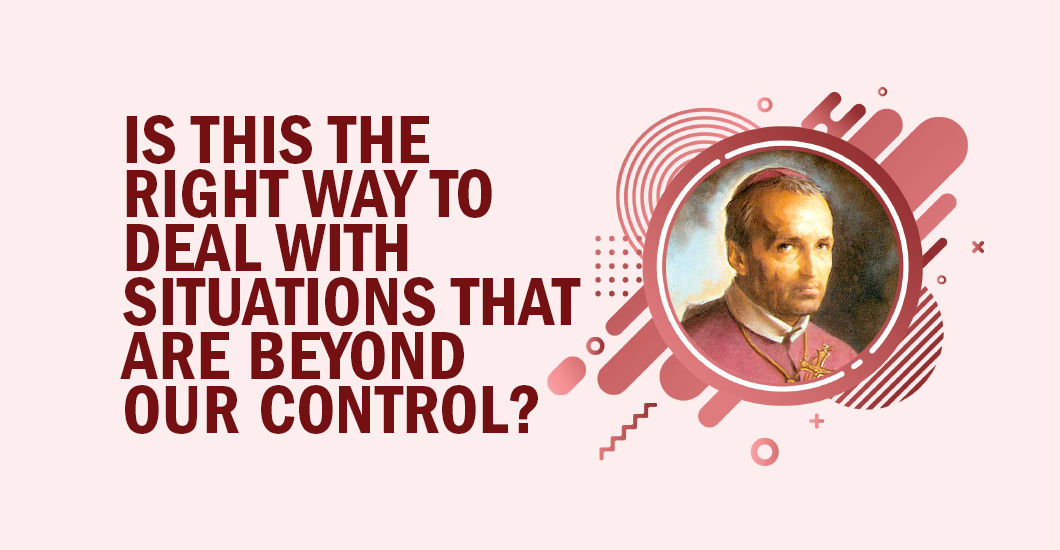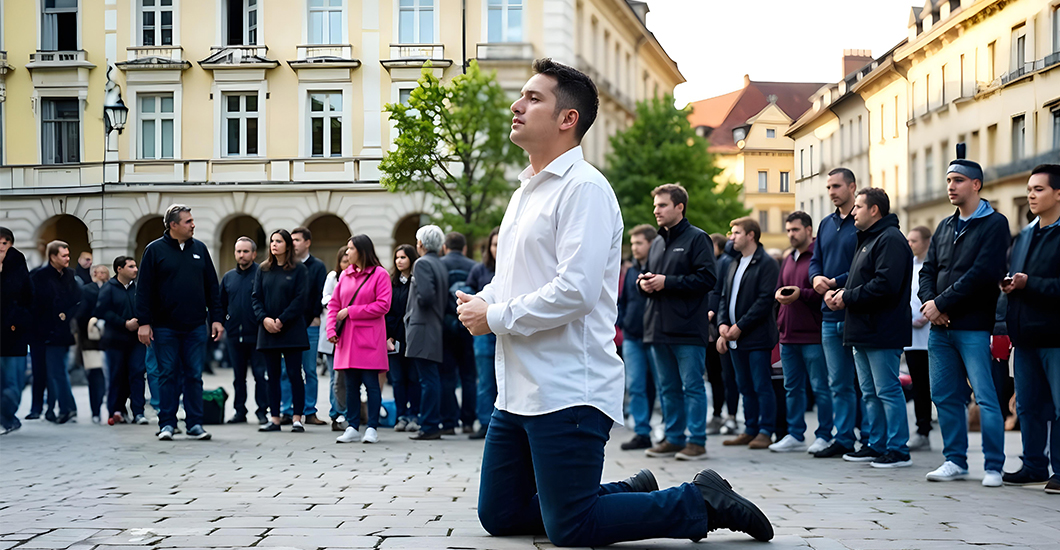Home/Evangelize/Article
Trending Articles
Saintly Musings: When Situation Goes Out of Control
When it is hot and humid, cold and windy, or during an epidemic, people often resort to expressions like: How unbearable the heat! How piercing the cold! What a tragedy!
Is this the right way to deal with situations that are beyond our control?
Saint Alphonsus Ligouri in his book, “Uniformity with God’s Will”, narrates an incident that happened in the life of Saint Francis Borgia:
Late one night Father Francis Borgia arrived unexpectedly at a Jesuit house during a snow storm. He knocked several times on the door but to no avail. They were all asleep. In the morning all in the community were greatly distressed and embarrassed to know that he had to spend the whole night in the open. Father Francis comforted them saying that he enjoyed the greatest consolation during those long hours of the night by imagining that the Lord was showering snowflakes upon Him from Heaven.
Saints are full of imagination!
How often have we lamented over natural weaknesses of body or mind? If only I had a brilliant mind, or a more robust body, I would have done wonders. But perhaps if I were more talented, athletic or attractive, I may have lost my soul! Great talent and knowledge have caused many to be puffed up with the idea of their own importance and, in their pride, they have despised others. How easily those who have these gifts may fall into sin and gravely endanger their salvation! On the contrary, how many who suffer poverty, infirmity or physical deformity have become saints! Let us be content with what God has given us. Only one thing is necessary and it is not beauty, not strength, not talent. It is the salvation of the immortal soul.
Shalom Tidings
Related Articles
Latest Articles
A true Christian can never close their eyes to injustice or spite. Ringo Starr once sang: “Got to pay your dues if you want to sing the blues/ And you know it doesn't come easy.” If we’re going to follow the way of Jesus, we must be prepared to accept the consequences, which will come hard and often. Choices & Consequences Jesus had predicted that His disciples would be flogged, dragged before governors, delivered up to councils, made to flee from town to town, ostracized, and hated—all because they are associated with Him. Why should they be surprised? After all, Jesus had the same things done to Him. The Cross of Jesus will be the Cross of His followers. Persecution is inevitable. As someone once said: “If you’re going to follow Jesus, you’d better look good in the woods.” Why? Put simply, a Christian, as a sign of contradiction grounded in sacrificial, self-giving love that promotes justice and peace, will call into question the prevailing values of the dominant consciousness of our society. The false kingdom of this world is based on the illusion that one can be happy by obtaining the goods of the world; so, we pursue the idols of money, status and acclaim, control and manipulation, and hedonistic pleasure. In our society, we see this displayed in over-the-top consumerism, nationalism, autonomous individualism, and a warped sense of freedom that is understood as free from external constraints. The false kingdom, which is the collective extension of the ego, needs to suppress the Good News, or it will die; it knows that. That's why Jesus’ followers are persecuted. Confronted with such hostility, anger, and resentment, we may wonder: “I go to church, I play by the rules; why am I not loved and admired? Why is there all this negative blow-back?” We may think to ourselves that it would be better to soft-pedal the truth. After all, why should I put myself and those whom I care about through such an ordeal? Why don’t we settle for a domesticated Christianity or a beige Catholicism in which we lean into the dominant consciousness of our society by going along, and even embracing its secular values? But if we don’t denounce the idolatrous practices of our culture—the exploitation of the poor by the wealthy, the toxicity of racism, the lies and deceit of those who exercise temporal power—can we live with this cowardice? Can we be true to our baptismal promises in which we were anointed priest, prophet, and king? As members of the Body of the Christ, each one of us is called to give witness to the Gospel values by word and example and that may mean, at times, being a ‘sign of contradiction’ in our families, in our working places, and in the wider society. The Only Way If we become homogenized, safe, and comfortable Catholics, then we will become people described by T. S. Elliot as “living and partly living.” The choice we have is either living a willful and egocentric life or embracing the Way of Jesus in which He is the center, and our life is about Him, and He is in control. We can’t have it both ways. As our Lord says quite clearly, “Whoever is not with Me is against Me, and whoever does not gather with Me scatters.” (Matthew 12:30) The way a seed withstands the scorching heat of the sun is by developing roots. By extension, we need to know and hold onto the deeper realities of faith, which can only be cultivated by a deep and abiding prayer life, by a daily reflection of Scripture and Tradition, by active participation in the Sacraments, especially Confession, and the Eucharist, and by serving others, especially those who are most vulnerable. These deeper realities of faith always involve knowing who we truly are, namely, beloved children of God, who are meant to be in communion with the triune God and in solidarity with our brothers and sisters. The only people who can accept the consequences of following Jesus are those who are in touch with their own souls and who have grounded themselves in the energy of God’s love. Only they will have the courage and resolve to persevere in the face of persecution.
By: Deacon Jim McFadden
MoreLetting go is not easy…But what happens if you do it? Ever since the age of one, I have been living in a foster home. George and Hazel, our foster parents, took care of almost ten of us. Our foster dad was an aggressive man, and we were all terrified of him. Every problem was addressed through acts of violence; what was even more terrifying was that he would often specifically pick me as his target. I suffer from acute asthma. One night, as I was in bed, coughing and wheezing, struggling to breathe, he came into my room and sat on top of me! He thrashed me so badly that I couldn’t lean on my back or move. Later that night, when everyone fell asleep, my foster parents secretly inspected my back; through the mirror, I not only saw the reflection of my back but also the shock on their faces. The next day, the other boys took a look and said it was blue-black from top to below. Though the people from foster care would come and check on us occasionally, we were too afraid to report on him. Toughest Decision Once his wife passed, his aggression intensified even more. The beatings got worse. One day, he had me in the corner and I was asked to lift my arms to be punched underneath so that there would be no visible bruises. I can't even remember what it was about. I was a fifteen-year-old boy feeling powerless against this grown, strong construction man. He punched me, again and again and again. Then, he looked directly into my eyes and told me something that changed my life forever. I’ll never be able to forget it because it far surpassed the pain of all the beatings he had given me put together. He said that the man who had me should have been castrated. All of a sudden, something sweet got broken inside of me. I remember him clearly asking me to stay there before he went inside. At that moment, I decided to run and never come back. It was snowing that night and I only had one jacket and a pair of shoes. I just ran. Things became horrible when I went to London to meet with my biological mother. We did not really know each other; we ended up arguing so much that I was thrown out of the house. That night, I wandered around as I had nowhere to go. For a split second, I felt like there were two choices before me—to live or call it a day. It was easier to call it a day; I wasn't worried about death. It all happened within a split second, but I told myself: “Yes, I want to live.” For a few nights, I crashed at my friends' places. While bouncing from one place to another, I got in contact with my foster brother Nigel back in Manchester. Over the months spent together, he had become a father figure to me. I started valeting and cleaning cars in his garage; everything was going pretty well. He watched over me and took care of me until one day, while we were at the gym, he suddenly collapsed and died. I was devastated and I fell into the deepest darkest place in my life. Making Amends I had no faith. I didn’t think about God. But one day, I found a video cassette in my letterbox; it was about the story of Jesus. I watched it several times, and I began to realize that there was a presence around me. As time passed, I realized that my relationship with God was growing deeper. The desire to be a Christian grew stronger in me and finally, I got baptized. I remember coming from the Baptism with the biggest smile that I just couldn't take off. As time flew by, I became an intercessor, praying for people who grew up in similar situations. And wonderful things happened. One day, at 5 in the morning, I was praying in my living room. An image of my foster father appeared to me. I had no contact with him, and I wasn’t really bothered about what was happening to him. But there was this strong urge in me that was directing me to see him. I was really nervous about the meeting; the last time I saw him, I was just a boy, and he was beating me. I finally turned up at the hospital. I had envisioned a big strong man, but there on the hospital bed was this frail old man. For a split second, I felt sorry. I asked my foster sister if I could pray for him. So, she woke him up and told him that I was there to pray for him. He said yes and went back to sleep. I pulled out a forgiveness card and put it at the end of the bed. I had some holy water with me and I started reading the last rites. Something strange happened. I prayed in songs and put water on his head. I had never done this before. In my mind, I was saying: “Jesus, do I need to do anything else?” I heard a voice that said: “The abused prays for the abuser and sets him free.” Then it hit me, it must be coming from the Lord…Who else could that come from? When you say: “You abused me, but I choose to forgive you,” the invisible chord that connects you to the abuser is broken at that very moment. It healed me from all the scars that I carried through my teenage years. A lot of that became non-existent and kind of melted away from the moment I forgave him. God used me to save him. It's a miracle in itself. It was phenomenal for me. Shortly after this, I realized there was someone else I needed to forgive–my biological mother–for abandoning me, letting me be abused, and later on, for throwing me out. It felt like I had dropped a whole weight when I forgave her. After that, I began living a godly life. Forgive and Move On God says: “If you forgive somebody in My name, I forgive them too.” He not only allows us to do it, but He will help us to do it. It's extremely hard to be a true Christian. It is very difficult to follow Christ and be Christ-like. It's a very difficult journey but one that is well worth it because when somebody's done something to you, you have the power to set yourself free through forgiveness. From the moment you forgive the person who hurts you, your new life begins. You can look forward to the joy and the beauty that is to come. So, I urge everyone who is holding something against somebody who's done you wrong, to forgive them. Forgiveness is a decision. Forgive. Let God do the rest.
By: Gary Taffe
MoreA man who walked the earth 800 years ago is still remembered for his simplicity… Picture this: A young man from medieval Italy with a life of parties, fashion, and everything a man could have wanted back then. But suddenly, something changes. A pivotal moment, an ‘aha’ moment that takes his life on a whole new path. Meet Saint Francis of Assisi, the ultimate party animal who became a spiritual superstar! He is known for his flowing brown robe and love for nature. He had a way with animals that could make even Doctor Dolittle envious. Birds gathered around him, rabbits hopped at his feet, and even ferocious wolves turned into cuddly companions in his presence. Talk about a real-life superhero! Heroic Life Saint Francis, a hero with a heart of gold! He wasn't the type of superhero to wear capes and shoot lasers; his true superpower was compassion. Francis had a way of finding joy in helping others, especially those less fortunate. He was like a real-life Avenger (but without the violence), fighting poverty and spreading love wherever he went. Instead of a Batmobile, he rocked a humble robe and sandals, zooming around town to lend a helping hand. Whether it was feeding the hungry, comforting the sick, or even talking to animals (yeah, Snow White vibes!), Saint Francis showed us that being a hero isn't about fame or fortune but about using our powers for good. Picture Francis, the peace guru, strutting down the city streets in his Jordans and a t-shirt that says 'Peace, Love, and Avocado Toast.’ Yeah, he's just like us, not literally (that would have looked like madness 800 years ago), navigating the chaos of modern life with a calm and centered vibe. Saint Francis knew that finding inner peace in our fast-paced world is like navigating a crowded subway during rush hour—challenging but possible. He wasn't a mystical guru on a mountaintop; he was a real human who faced our daily struggles. From deadlines to traffic jams, he understood that peace starts within us, even amidst the hustle of everyday life. Saint Francis always sat in silence and prayer, talking to God while all the animals listened. He had a peace that we can only dream of. We must ask Saint Francis to give us this peace; I promise it’s worth it. We can learn many lessons from the life of Saint Francis, some of which are simplicity and humility. He is a man who lived a life of poverty but was still able to care for people experiencing poverty. This concept of poverty is often misunderstood or even dismissed by many young people today. The youth of this generation are sucked into a world of social media, expectations, and possessions, often spending hundreds of dollars on shoes, clothes, and phones just to ‘look cool.’ Take a look at Saint Francis’s life; he was the son of a wealthy businessman, he had lots of money and worldly pleasures, but he gave everything up to follow Jesus. He took a vow of poverty and dedicated his life to Jesus. He might not be new-gen, but there are so many lessons to learn from his life–his simplicity, humility, peace, and inner transformation. We might think that it’s the Jordans and iPhones that matter, but is it really? Saint Francis reminds us to prioritize what truly matters—genuine connections, selfless service, and inner peace. By embracing his teachings, we can find fulfillment in leading simpler lives, extending kindness to others, and nurturing our own well-being. Saint Francis' example serves as a guiding light, encouraging us to step away from the noise and busyness of modern life and reconnect with the essence of what it means to be human. Let us carry forward his legacy, incorporating his wisdom into our daily lives and making a positive impact on the world around us.
By: Delon Rojes
MoreTom Holland’s magnificent book Dominion develops in detail what amounts to a very simple proposition—namely, that Christianity is responsible for many of the central values that we take for granted and that we assume to be universal. In point of fact, he avers, our insistence upon the dignity of the individual, fundamental human rights, the principle of equality, and perhaps above all that the poor, the marginalized, and the victimized ought to be specially cherished, flows from basic Christian convictions. What prompted Holland to investigate this claim initially was his extensive work in the history of ancient Rome. The longer and more deeply he looked at Roman society, the stranger it seemed, the less like our own time. And the more he studied the great heroes of Rome, the more alien and morally problematic they appeared. To give just one example among many, he urges us to consider perhaps the most impressive of ancient Roman personalities, Julius Caesar. Eager to enhance his political reputation, Caesar embarked on a military campaign in Gaul (present-day France). His remarkable success in subduing this land and making it a Roman province served to cover him in glory and became the subject of his book The Gallic Wars, which is read to this day. But what is rarely remarked upon is the staggering fact that in the course of this conquest, Caesar killed, by conservative estimate, one million people and enslaved another million or so more. Now, Caesar had a boatload of enemies in Rome who suspected him of lusting after kingly power. But what Holland finds fascinating is that none of his opponents were scandalized by his murderous rampage through Gaul. In fact, all of Rome praised him for it. So the question arises: Why would we today consider someone who killed and enslaved on such a massive scale a scoundrel while even the best and brightest in ancient Roman society considered Caesar a hero? The answer, in a word, is Christianity. What the early Christians brought to Roman culture was the belief in the one God who made every human being in His image and likeness and who thereby endowed them with rights, freedom, and dignity. Moreover, the Christians taught, the Creator God became human and went willingly to the very limits of suffering and degradation, in Saint Paul’s words, “accepting even death, death on a cross.” They proclaimed a Savior who was a victim of Roman tyranny and whom God raised from the dead. And by this proclamation, they brought all the tyrannized, all of the victimized, all of the weak and forgotten from the margins to the center. These beliefs were, of course, initially regarded as absurd, and the early Christians were brutally persecuted for them. But over time, and through the witness and practice of courageous people, these beliefs soaked into the fabric of Western society. So deeply did they penetrate our consciousness that we came, as Holland has argued, to take them for granted and to mistake them for general humanistic values. Now, why is all this important to us today? We live in a time when the Christian faith is rather regularly denigrated by those in the upper echelons of elite society, in the universities, and in the media. Moreover, armies of people, especially the young, are disaffiliating from the churches and ceasing to engage in religious ritual and practice. Harmless enough, you might think, or even to the advantage of a society reaching maturity through secularization? Think again. As Christian faith and praxis evanesce, the values that Christianity has inculcated in our culture evanesce as well. Cut flowers may bloom for a time once they’ve been ripped from the soil and placed in water, but they will fade soon enough. We delude ourselves if we think that the values instilled in us by Christianity will long survive the demise of Christianity itself. Signs of the emergence of a neo-paganism in fact abound. In many states in our country, as well as in Canada and many European countries, a regime of euthanasia holds sway. When elderly or sick people become inconvenient, they can and should be eliminated. And, of course, in most countries in the West, when a child in the womb is judged to be a problem, he or she can be aborted at any point in pregnancy, up to the moment of birth. In my home state of Minnesota, a proposal has been made to enshrine this ‘right’ to the murder of the unborn in the constitution. How like this is, by the way, to the ancient Roman practice of exposing unwanted newborns to the elements and the animals. And how fascinating, in light of Tom Holland’s analysis, that the early Christians got the attention of the environing Roman culture precisely by their willingness to rescue and take in these abandoned babies. So, what is the needful thing? Christians must raise their voices in protest against the culture of death. And they must do so by claiming and publicly proclaiming the values that come from their faith. For too long, believers have been cowed into silence by the insinuation that religion is a ‘private’ matter. Nonsense. Christian values have informed our society from the beginning and have provided the coherent moral framework that most of us still take for granted. Now is not the time for quietude. It is time for us to shout our convictions from the rooftops.
By: Bishop Robert Barron
More




